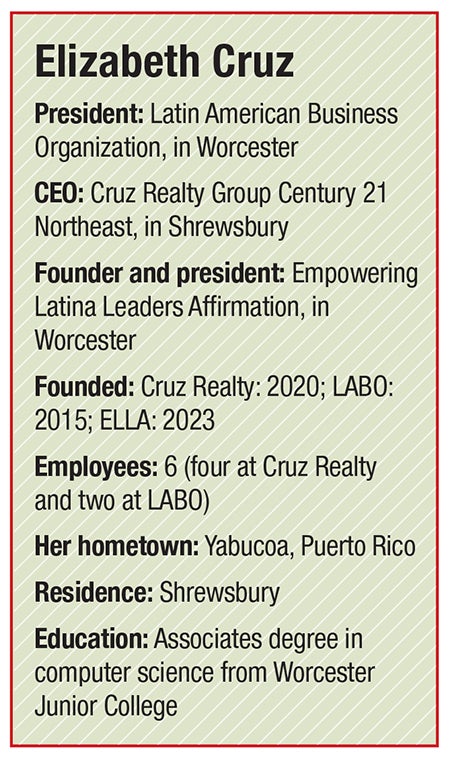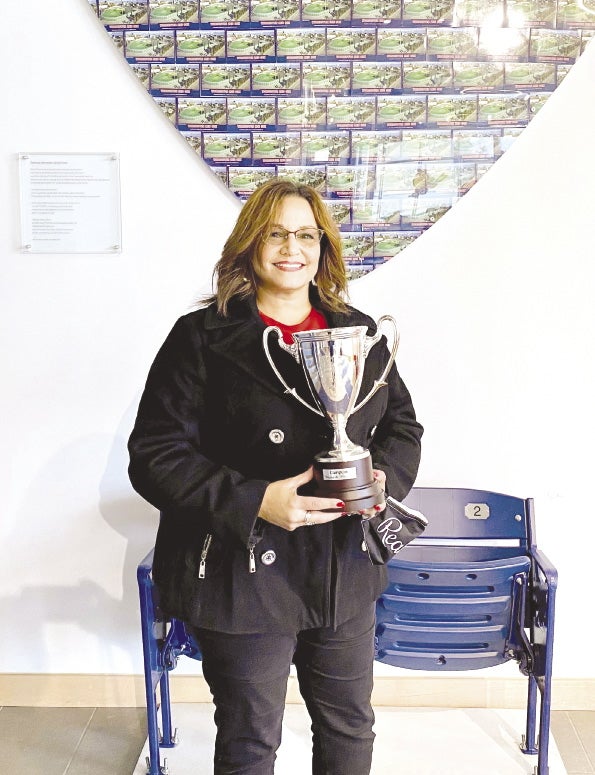Elizabeth Cruz is driven to share her secret to business success with other entrepreneurs like her.
Get Instant Access to This Article
Subscribe to Worcester Business Journal and get immediate access to all of our subscriber-only content and much more.
- Critical Central Massachusetts business news updated daily.
- Immediate access to all subscriber-only content on our website.
- Bi-weekly print or digital editions of our award-winning publication.
- Special bonus issues like the WBJ Book of Lists.
- Exclusive ticket prize draws for our in-person events.
Click here to purchase a paywall bypass link for this article.
Elizabeth Cruz is a consummate people person. She wears many hats in the Greater Worcester business community after following divergent career paths in software consulting and real estate in the early 1990s. This led her to her other passion: advocacy for other Latino business people.

As president of the Latin American Business Organization and a newly formed Latina business advocacy group known as ELLA, Cruz is driven to share her secret to business success with other entrepreneurs like her. A member of the Worcester Red Sox Wepa Advisory Committee meant to strengthen the Minor League Baseball team’s connection to the Latino community, Cruz is always looking for ways to further establish the Latino community as a cultural and economic force in Greater Worcester.
Her story began in her native Puerto Rico where she was born the youngest of eight children. Her older sisters wanted a traditional homemaker lifestyle, but Cruz knew she didn’t. Later settling in Southbridge with her family, Cruz hopes her example will lead other girls and women to survey their options.
Software and real estate seem to be unrelated fields. How did you end up a business owner in both industries?
To this day, I don’t understand what happened there. I love coding, and I love working with people! When I went to college, I was the only female in my class, and people would whisper about me. I was going to show them, and I graduated with honors. I look back, and I’m glad they put that kind of pressure on me.
After I graduated I started going out and talking about my job with undergraduate students through Clark University, and I noticed Latinas weren’t interested in coding. They wanted to work in social services and teaching. That's when I started getting involved with the community, showing young women this was a career path they could take. Then I took a leadership program through United Way in 1992, and I came across a man who ran a real estate company. He asked me to join his team. I didn’t want to leave computers, but he said I could do it part-time.
Were you trailblazing as a Latina in real estate?
I never really took advantage of being one of the few Latin Realtors at that time. Now there are a lot of them. I wasn’t looking at it as a business; I was helping people. After I became a Realtor, an organization called Worcester Community Housing Resources hired me to be a homebuyer counselor for a program of Fannie Mae. I was also working full-time in software at Paul Revere Insurance, now Unum.
Why go into commercial real estate?
I started doing a lot of work with people buying small businesses like a store or a restaurant, so I became involved in commercial real estate. I launched this program, Empowering Women Through Real Estate. I teach women about investing in multifamilies, commercial properties, and buying your first home. That was what I was doing when I became involved with LABO.
Do you have a niche?
I deal with a lot of minority clients including those from China, India, and Japan. I learned from them how they were so successful in business in other countries before coming to Greater Worcester to invest in commercial properties. There was a gap there from the Latin community. I’m working with someone who was told they could create a 10-unit company. They spent $4 million, but the numbers don’t work, so I strategized with them and came up with a plan to make the money work for them.
I show clients the benefits of going from one unit to 10 and then maybe a strip mall. I train clients in dealing with tenant issues, such as when they need to go through the eviction process in court.
What led you to launch ELLA in 2023?
Entrepreneurship is in Latinas’ DNA. Everyone you talk to says their aunt, uncle, or other family member has their own business. ELLA was something I’ve been thinking about for 30 years. I wanted to become a mentor for getting Latinas into computer science, then into the business side of real estate, and then encouraging small businesses to become leaders too. All of that evolved into what ELLA is.
Has the Latino community truly been embraced in Worcester, in the workplace and otherwise?
Having a city manager who is Latino, Eric Batista, who went to school here, that’s a really good sign the city is accepting the reality we’re here. People don’t realize, four in five Hispanics are U.S. citizens. It’s a huge, powerful voting machine. In the last U.S. Census, Worcester came out as 25% Hispanic.
As I go out there on behalf of LABO and ELLA, educating big companies, the message is, “If you’re not embracing big demographic changes, what makes you think you’ll be around five years from now?”
People are realizing the growing Latino demographic is not changing.
This interview was edited for length and clarity by WBJ Correspondent Emily Micucci.

